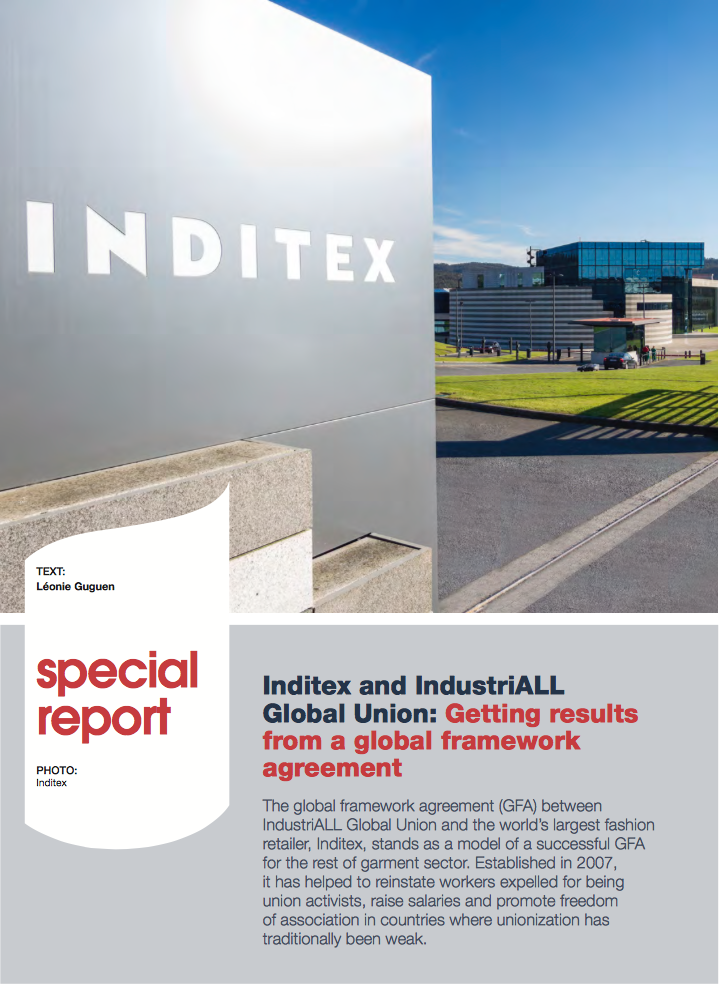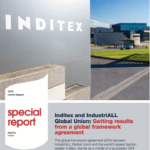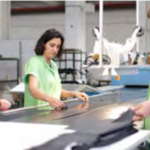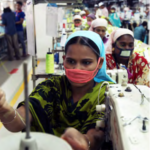21 May, 2014The global framework agreement (GFA) between IndustriALL Global Union and the world’s largest fashion retailer, Inditex, stands as a model of a successful GFA for the rest of garment sector. Established in 2007, it has helped to reinstate workers expelled for being union activists, raise salaries and promote freedom of association in countries where unionization has traditionally been weak.
Special Report
Text: Léonie Guguen
A GFA serves to protect the interests of workers across the operations of multinational companies, setting the best standards for trade union rights, health, safety and environmental practices. GFAs are constantly reviewed and improved by IndustriALL.
The Agreement allows us to do our work with the factory owners
says Isidor Boix from Spanish union Industria-CC.OO, who acts as IndustriALL’s coordinator for implementation of the GFA with Inditex.
We have been able to translate the good intentions written in the contract into concrete activities.
Spanish-based fashion group Inditex has 6,340 stores in 87 different countries employing more than 128,000 people worldwide. The retail and administration staff is covered by a GFA concluded with UNI Global Union. Largely consisting of the Zara chain of stores, Inditex also has seven other brands: Massimo Dutti, Bershka, Stradivarius, Oysho, Pull & Bear, Uterqüe and Zara Home.
Much of the company’s success has been achieved by adopting the latest catwalk looks and delivering them to the high street in a matter of weeks. To achieve such a rapid turnaround from design studio to shop floor, approximately 50 percent of production is manufactured in proximity countries to Spain such as Turkey, Portugal and Morocco. Other key areas of production include Brazil, Argentina, Pakistan, China, India, Bangladesh and South East Asia. It has approximately 6,000 different suppliers.
The GFA between IndustriALL and Inditex covers more than a million garment workers toiling for the group.
As a global organization, IndustriALL has the capacity to reach and defend workers spread out across the group’s enormous supply chain. The GFA has succeeded in integrating workers’ rights into the group’s corporate behaviour and ethical guidelines. As a result of this positive partnership, factory owners are learning to consider trade unions as key to creating a sustainable workforce
– Jyrki Raina, IndustriALL’s general secretary
The GFA is like a direct line of communication between the workers and the company here… It is a way to receive the problems and be involved in the solutions. We have been able to resolve some critical situations in some countries.
– Félix Poza,
Director of Corporate Social Responsibility at Inditex
The relationship has progressed well beyond the original agreement, with Inditex and IndustriALL taking on joint training initiatives and country visits.
The GFA is something we have integrated into our normal activities.
However, success was not achieved overnight and there were five years of dealings with Inditex before the 2007 GFA was signed with IndustriALL’s predecessor the International Textile, Garment and Leather Workers’ Federation (ITGLWF).
It was the 2005 Spectrum factory collapse in Bangladesh that spurred greater action from Inditex. Sixty-four workers died and 80 people were injured when a building with an illegal number of floors collapsed. The ITGLWF fought to secure compensation for victims from brands sourcing from the factories. In the end it was only Inditex, whose supplier had subcontracted to the factory, which agreed to pay compensation in line with international standards.
The cooperation over the Spectrum disaster boosted the relationship between ITGLWF and Inditex and led to the GFA being signed in October 2007.
The collaborative agreement sets out to ensure the effective application of International Labour Standards throughout Inditex’s supply chain including those workplaces not represented by IndustriALL trade unions. It also means IndustriALL is recognized by Inditex as its global trade union counterpart for workers in its Corporate Social Responsibility (CSR) commitments.
Corporate Social Responsibility can be a problem for unions because it is very unilateral. It is the companies that make the decisions and carry out the audits and so on… Other big brands, for example H&M and Gap, have got CSR declarations but they lack a clear definition of the role of unions. The GFA provides a much-needed mechanism to establish a relationship between Inditex’s CSR agreement and local unions. The local union can say to Inditex ‘I want to visit this factory to see what happens there’ and Inditex will phone the factory and organize it.
– Isidor Boix
In the past 12 months, IndustriALL has carried out numerous factory visits in seven different countries. Since 2007, the GFA has enabled IndustriALL to resolve problems of the liberty of unions, monitor working conditions in suppliers’ factories and successfully fight for the reintegration of workers expelled for being unionists, for example in Peru, Turkey and Cambodia.
We are free to talk openly to workers without factory owners or Inditex being present
The GFA also further enforced workers’ right to organize in Inditex’s Code of Conduct for External Manufacturers and Suppliers, which has ‘respect for freedom of association and collective bargaining’ as one its pillars.
However, in practice, implementing unionization is not necessarily straightforward.
It is a mechanism that doesn’t always work well. In countries like Morocco it is very difficult to establish a union presence, whereas in countries like Brazil it is much easier.
– Isidor Boix
It is a challenge for everybody, also for IndustriALL, which has to work in many countries to improve the capacity of the local trade unions.
– Félix Poza
Many factories have no union representation at all, so we talk to workers about the role of unions, trade union law and help establish organization in the factories… For a lot of people we meet, it is the first time they have ever been given the chance to talk about their working conditions collectively.
– Isidor Boix
Living Wage
As a direct result of the GFA, the concept of a living wage was introduced into Inditex’s Code of Conduct. “Wages should always be enough to meet at least the basic needs of workers and their families and any other which might be considered as reasonable additional needs” it reads. This definition was agreed with former head of ITGLWF Neil Kearney and introduced to the Code in 2007.
It is a key point and milestone for us. Including a definition of an acceptable wage was a radical concept at the time,
says Indalecio Pérez from Inditex’s CSR department.
What is the impact of wages on the price of a piece? In many cases it is just cents when you compare it to the price of the raw materials, the cost of the cutting, manufacturing and transport… We have been living with increasing salaries in the past year and the business is still running.
– Félix Poza
However, Pérez admits it is often difficult to make an impact acting individually:
We are just one company, even if we are a big company. But if you compare our entire production to production worldwide, we are a small percentage. We have limited effect if we go it alone. We (brands) need to tackle it together, and deal with local organizations and credible institutions and governments. We cannot substitute the role of governments.
2012 Protocol
As Inditex has grown into a fashion colossus so the GFA with the company has strengthened. The 2012 Protocol further advanced the agreement by specifying the role of trade unions in the enforcement of the GFA within Inditex’s Supply Chain.
the 2012 Protocol developed the practical side of the accord… The evolution of Inditex has also been the evolution of our relationship with them.
– Isidor Boix
The Protocol recognizes the important role that local unions play in implementing the GFA given their proximity to factories. Where local unions identify a breach regarding the GFA it will notify Inditex and IndustriALL, who will introduce a Corrective Action Plan should a breach be confirmed.
Central to the Protocol is that IndustriALL and Inditex put in place training schemes aimed at providing a better understanding of the GFA. These should involve managers, officials, workers and supervisors from suppliers and external manufacturers, as well as representatives of local trade unions from each of the countries involved.
In addition to the original GFA, the Protocol requires Inditex to give a full list of all its 6000 suppliers and subcontractors including the volume of their production for Inditex, enabling IndustriALL and local union affiliates to make better contacts with workers.
The Protocol also marks a complete shift in attitude by Inditex with regard to workers and unions.
In 2012 we dramatically changed the relationship with IndustriALL in a positive way because we tackled the relationship with the unions from a preventative point of view… We realized that asking for a living wage, asking for freedom of association and promoting collective bargaining is a preventative and a proactive way of guaranteeing a sustainable supply chain.
– Indalecio Pérez
Training
As a result of the 2012 Protocol, joint IndustriALL and Inditex training projects have taken place in countries including Turkey, Morocco, Brazil, Portugal, Argentina and China.
The training has been positive and an opportunity to talk to workers and trade unions in a different way… We get to hear about the needs of the workers and what can be improved. Ultimately, we are talking about the sustainability of the factory and in the end you are talking about the sustainability of the entire business model.
– Félix Poza
The meetings have given IndustriALL and local trade unions an opportunity for open dialogue with top management at the factories, which has been unprecedented in many countries.
Training projects, which always include IndustriALL representatives, have been started in nearly all supplier countries, also providing a new opportunity to build relationships between the Inditex’s country CSR teams and local trade unions.
When we started we didn’t have any involvement with local trade unions and now in a very short time we have created channels of communication in each of the countries.
GFA Coordinators
In a further significant step, Inditex has committed to funding a network of coordinators whose sole role is to help implement the Agreement. Trade union experts will be assigned in countries with significant production output for Inditex and will be able to work with the company’s local CSR teams. The first GFA Coordinators will be assigned to Bangladesh, Cambodia, Turkey, India, China and Latin America.
A structure of GFA coordinators will enable Inditex and IndustriALL to share a constant dialogue with local affiliates, as has been achieved to a large extent in Turkey, Portugal, Brazil and Bangladesh.
Bangladesh health and safety commission
Alarmed by the high number of deaths caused by fires in Bangladeshi garment factories, Inditex launched a joint project with IndustriALL in January 2013 to carry out fire assessments and set up health and safety commissions in 200 factories in the country.
The project will help factories to be better organized and improve evacuation procedures in the case of an emergency. A Health and Safety Committee, which must be composed of union members, will be set up inside each factory and elected by the workers.
After the April 2013 Rana Plaza factory collapse, which killed 1,138 garment workers, Inditex inspectors began evaluating Bangladeshi suppliers in terms of structural risk as well.
Inditex is a signatory to the Bangladesh Accord on Fire and Building Safety, the ground-breaking agreement led by IndustriALL and UNI following the Rana Plaza disaster which commits brands to improving safety conditions in the country’s garment factories.
Inditex has given the audit reports from its own fire and structural inspections to the Accord’s administration.
As the GFA continues to grow and develop, Poza credits it with promoting mature industrial relations for the company.
The results of our collaboration have always been very positive and the Agreement has given us the capacity to solve problems. Sometimes it has provided solutions for other brands as well.
Monika Kemperle, IndustriALL's assistant general secretary says:
With Inditex there is a willingness to cooperate even if we do not always see eye-to-eye… The Global Framework Agreement is an invaluable bond and the recognition of a long-term commitment from both sides to improve conditions for workers at all extents of Inditex’s vast supply chain.







